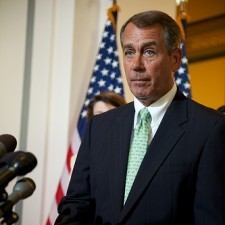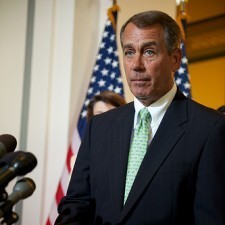 Last year, cap-and-trade passed the House. Don’t expect anything close to that now that John Boehner (R-Ohio) is in charge.
Last year, cap-and-trade passed the House. Don’t expect anything close to that now that John Boehner (R-Ohio) is in charge.
John Boehner’s orange glow is brighter than ever today. The Ohio Republican, who once said that “the idea that carbon dioxide … is harmful to our environment is almost comical” is the new speaker of the House. The U.S. House, where just a year ago, actual cap-and-trade legislation passed, is now ruled by the party of climate-change skeptics, assuring that nothing like that will happen again anytime soon.
Slap and fade: It does seem that at least some House Democrats who voted for cap-and-trade legislation last year paid dearly for their indiscretion. Nearly two dozen of them lost yesterday. No defeat was more stunning than that of Rep. Rick Boucher of Virginia — a 14-term congressman and a big booster of coal who nonetheless voted for the House’s climate change legislation. [Politico]
Boucher’s former chief of staff, Andy Wright, put it bluntly:
I don’t think there’s any question about it, cap-and-trade was the issue in the campaign. If Rick had voted no, he wouldn’t have had a serious contest.
Added Linda Stuntz, an industry attorney who worked in the Energy Department during the Bush Administration:
It’s going to be cap and tax forever more, and I don’t think any of these guys are ever going to touch it again. I think anyone who thinks there’s vitality left is kidding themselves.
Tony Massaro, senior vice president of political affairs for the League of Conservation Voters, wasn’t so sure that cap-and-trade was a huge factor:
I don’t really see that ACES [the American Clean Energy and Security Act] played a particularly significant role in the election either way. Democrats are losing and it doesn’t matter which way they voted on ACES.
[The Hill]
[Editor’s note: Christopher Mims also makes the point in Grist that the election was not a referendum on the climate bill.]
The old shall rise again: One thing that was clear is that a lot of the young voters who helped sweep Barack Obama into the White House two years ago sat this one out. As Jonathan Chait noted in The New Republic:
… the age gap is the real tidal shift. In 2008 Republicans won voters over 65 years old by 8 points, but were crushed among voters under 30 by more than 30 points. The under 30 vote outnumbered the over 65 vote. In 2010 Democrats still crushed Republicans among the under 30 vote, albeit by just 20 points. But the over 65 vote went Republican by a massive 20 point margin … In 2008, the young were 18% of the electorate, and the old were 16% of the electorate. In 2010, the young were 10% of the electorate, and the old were 24% of the electorate.
Cue the pundit parade:
Darren Samuelsohn and Robin Bravender [Politico]:
Come January, Obama will be working with a Congress that will have little appetite for the types of sweeping energy reform he sought over the last two years. With the House in Republican hands, some of the climate issue’s most vocal advocates have been dislodged from their powerful perches, including Speaker Nancy Pelosi and Energy and Commerce Committee Chairman Henry Waxman.
Jeremy Symons, National Wildlife Foundation:
Big picture: There will be new faces in Washington, but clean energy and the environment are mainstream issues that resonate with voters today more than ever. As they did after the 1994 elections, polluters will probably push the new Congress to overreach and roll back environmental protections. But that would backfire today just as it backfired then. The real appetite in the new Congress will be for bipartisan, bite-sized pieces of energy policy that protect our environment and grow our economy.
John Judis [The New Republic]:
… when the U.S. finally recovers, it is likely to re-create the older economic structure that got the country in trouble in the first place: dependence on foreign oil to run cars; a bloated and unstable financial sector that primarily feeds upon itself and upon a credit-hungry public; boarded up factories; and huge and growing trade deficits with Asia. These continuing trade deficits, combined with budget deficits, will finally reduce confidence in the dollar to the point where it ceases to be a viable international currency.The election results will also put an end to the Obama administration’s attempt to reach an international climate accord. It will cripple its ability to adopt domestic limits on carbon emissions.
Danny Bradbury and James Murray [Business Green]:
Obama has said that he wants to pass energy and climate legislation “in chunks” next year, but with an already divided Congress set to become even more partisan he can expect fierce opposition to many of the proposals currently being considered. Climate change could also slip further down the agenda, with the budget deficit and healthcare reforms expected to become the main focus for Republican in Congress.
E.J. Dionne [Washington Post]:
Conservatives believe in freedom for the corporate sector, in limiting what the federal government does and in tax cuts for the best-off. Progressives believe in a government that promotes modestly more equality, regulates business in the public interest and sees public action as promoting American competitiveness. This election didn’t change that. It is a setback for progressives, not a permanent defeat. They took real losses but held their own in the Senate and in key governors’ races. The real showdown takes place in two years — and with the electorate equally disapproving of both Republicans and Democrats, that battle is wide open.
Tim Rutten [Los Angeles Times]:
The Republicans’ congressional leaders also are likely to resist compromise, though for reasons of their own. (If you’re getting a sense of conflicting agendas as opposed to clear mandates, there’s a reason.) Rep. John Boehner of Ohio, who barring something unforeseen will be the next speaker of the House, has said repeatedly on the stump that “there will be no compromise” in the next
Congress. Another House Republican leader, Mike Pence of Indiana — a likely presidential candidate — told a television interviewer that “there will be no compromise in ending this era of runaway spending, deficits and debt, no compromise on repealing Obamacare lock, stock and barrel.”
George Packer [The New Yorker]:
This midterm is the party’s first salvo in its first order of business, to end Obama’s Presidency. There will be little mercy and a great deal of rancor. Tomorrow we’ll find out how Obama sees the next two years. I see one of the ugliest political periods in my lifetime, which has seen a few.
Enjoy your day.



